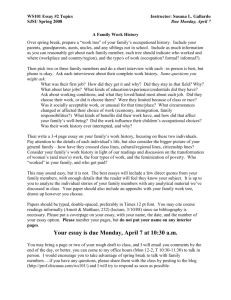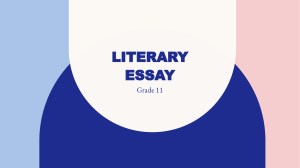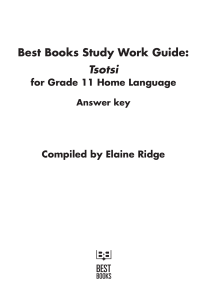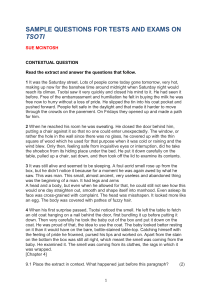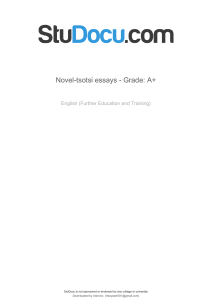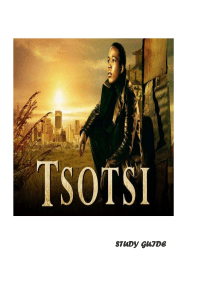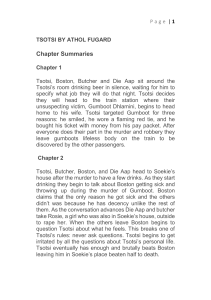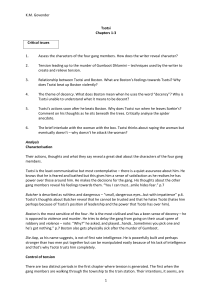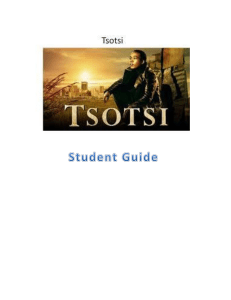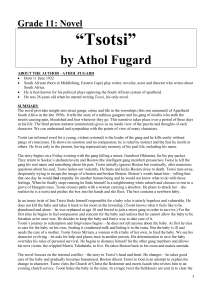EN 222- Texts and Representations Course Syllabus.docx
advertisement
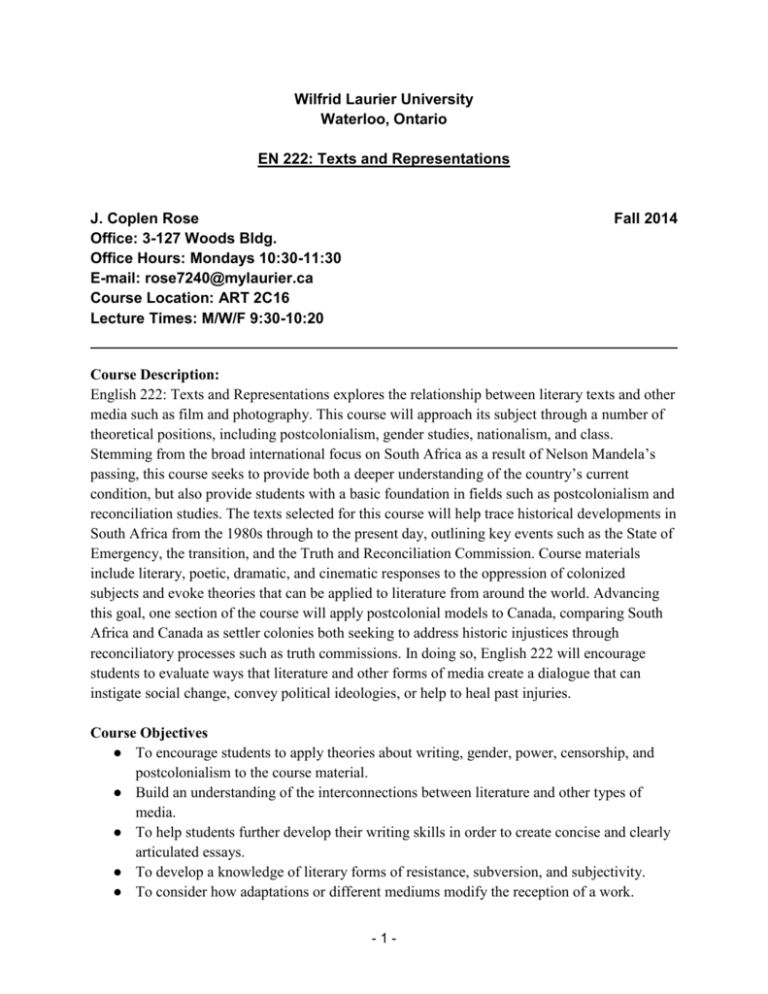
Wilfrid Laurier University Waterloo, Ontario EN 222: Texts and Representations J. Coplen Rose Office: 3-127 Woods Bldg. Office Hours: Mondays 10:30-11:30 E-mail: rose7240@mylaurier.ca Course Location: ART 2C16 Lecture Times: M/W/F 9:30-10:20 Fall 2014 Course Description: English 222: Texts and Representations explores the relationship between literary texts and other media such as film and photography. This course will approach its subject through a number of theoretical positions, including postcolonialism, gender studies, nationalism, and class. Stemming from the broad international focus on South Africa as a result of Nelson Mandela’s passing, this course seeks to provide both a deeper understanding of the country’s current condition, but also provide students with a basic foundation in fields such as postcolonialism and reconciliation studies. The texts selected for this course will help trace historical developments in South Africa from the 1980s through to the present day, outlining key events such as the State of Emergency, the transition, and the Truth and Reconciliation Commission. Course materials include literary, poetic, dramatic, and cinematic responses to the oppression of colonized subjects and evoke theories that can be applied to literature from around the world. Advancing this goal, one section of the course will apply postcolonial models to Canada, comparing South Africa and Canada as settler colonies both seeking to address historic injustices through reconciliatory processes such as truth commissions. In doing so, English 222 will encourage students to evaluate ways that literature and other forms of media create a dialogue that can instigate social change, convey political ideologies, or help to heal past injuries. Course Objectives ● To encourage students to apply theories about writing, gender, power, censorship, and postcolonialism to the course material. ● Build an understanding of the interconnections between literature and other types of media. ● To help students further develop their writing skills in order to create concise and clearly articulated essays. ● To develop a knowledge of literary forms of resistance, subversion, and subjectivity. ● To consider how adaptations or different mediums modify the reception of a work. -1- Breakdown of the Course Grade 1. Attendance and Preparation: 2. Short Presentation: 3. Reading Responses: 4. Research Essay: 5. Final Exam: 10% 10% 10% (2 Responses at 5% each) 40% 30% 1. Attendance and Preparation This grade is based on regular attendance in the course and appropriate preparation for each lesson. This requires that you arrive having read the prescribed readings for the week, as well as having taken some time to reflect upon the subjects we will be discussing in the lectures. This grade will also reflect whether or not you bring the necessary materials to class, such as the course text, and actively participate in discussion. 2. Short Presentation Beginning in the second week of the course each student will take turns giving a short presentation on a key concept, term, or historical event related to the course readings for the week. This should only be a brief presentation and not exceed five minutes. Power point will be permitted, but please limit your presentation to one or two slides. The purpose of this exercise is to provide some additional information pertaining to the topic being covered in the course. It is strongly encouraged that you present the information using point form notes instead of reading off of a sheet of paper. Depending on class size, it is likely you will work in groups of two to develop this short presentation. A sign-up sheet with presentation topics will be circulated in week one of the course. If you missed attending the opening lecture, please sign up with me as quickly as possible. 3. Reading Responses At two points throughout the semester there will be assigned reading responses to course material. These assignments are intended to encourage students to think critically about the readings and to develop a response based on theories discussed in class. This exercise is also intended to help students prepare for the essay by helping to highlight major trends and concepts they see appearing repeatedly throughout the course. There will be two papers assigned, each worth 5% of the final course grade. Papers should be in MLA format and be approximately 2 pages (500 words) in length. Students are encouraged to use this exercise as a way of testing concepts or ideas for their essay. Reading responses should reflect upon the required readings in the week the exercise is due. Late papers will be penalized 2% per day, including weekends. 4. Research Essay The research paper should respond to the key concepts in the course. The essay must be approximately 5 to 6 pages (1250 - 1500 words) in length and follow proper MLA style. Topics -2- for the essay will be distributed in the second week of the course and students are to choose one topic/question from the list and respond to it directly. The essay should have an engaging title, a clear thesis statement, a defined body where the argument is supported, as well as a conclusion. Additionally, the essay should draw on secondary sources outside of course readings. A minimum of one secondary source that does not appear in the course readings must be used in the essay. Students may also use as many sources from the course readings as they wish. If students have any questions concerning the essay and its components, please do not hesitate to contact me. Late papers will be penalized 2% per day, including weekends. 5. Final Exam The final exam will consist of short answer questions and short essays. Students will be asked to select from a list of short answer options, for example giving a definition and explaining the significance of a term from the course. In addition to the short answer questions students will also be asked to complete a short essay on material from the course. There will be a selection of three questions and students will be asked to select one and write a response. Texts: 1) Country of my Skull by Antjie Krog (Broadway) 2) Crush-hopper by Mandisa Haarhoff (Course Pack) 3) Disgrace J.M. Coetzee (Vintage) 4) Selected Short Stories by Nadine Gordimer (Course Pack) 5) Selected First Nations Poetry and Short Stories by Armand Garnet Ruffo, Thomas King, and Louise Halfe (Course Pack) 6) Tsotsi by Athol Fugard (Grove Press) Films 1) Tsotsi by Gavin Hood Weekly Reading/Viewing Schedule Week Dates Topics/Unit/Readings/Screenings 1 Sept 5 2 Sept 8-12 Introduction to EN 222 and Explanation of key terms. September 8th – Further introduction to the course with online samples of Mzi Mahola’s poetry. Read “The Disempowerment of First North American Native Peoples and Empowerment Through Their Writing” in Course Pack. -3- Assignment/Tests Due Sign Up Sheet for Presentations 3 4 5 6 7 Playwright turned Novelist: Fugard’s Portrayal of Apartheid Urban Johannesburg Sept 15-19 Gangsterism and the Crisis of Violent Crime Sept 22-26 Digitally ReThinking South Africa after Apartheid Sept 29-Oct 3 Moving Towards Freedom Oct 6-10 Joy, Fear, and the Transition Oct 13-17 Oct 20-25 Forgiveness, Reconciliation, and the TRC 8 Oct 27-31 Nationalism in Post-Apartheid South Africa 9 Nov 3-7 Indigenous Short Stories: Historical Narratives, Forgiveness, and the Canadian Context September 10th and 12th – Athol Fugard’s Tsotsi Athol Fugard’s Tsotsi and Jonathan Kaplan’s Introduction to Tsotsi Reading Response #1 Due on September 17th. Gavin Hood’s film adaptation of Tsotsi and “Mdlwembe” Music Video by Zola Essay Topics Distributed on September 24th. “Oral History” and “The Moment Before the Gun Went Off” by Nadine Gordimer “A Lion on the Freeway,” “A Soldier’s Embrace,” and “Once Upon a Time” by Nadine Gordimer University Fall Reading Week, No Classes Antjie Krog’s Country of my Skull “They Never Wept, the Men of My Race” “None More Parted than Us” “Two Women: Let Us Hear It in Another Language” “Letters on the Acoustics of Scars” Antjie Krog’s Country of my Skull “Mother Faces the Nation” “It Gets to All of Us – from Tutu to Mamasela” Thomas King’s “Joe the Painter and the Deer Island Massacre” (Course Pack) “Poem for Duncan Campbell Scott” by Armand Garnet Ruffo (Course Pack) Thomas King’s “Borders” (Course Pack) Poetry Selections from Louise Halfe (Course Pack) -4- Reading Response #2 Due on October 8th. Essay Due on November 5th. 10 11 12 13 Nov 10-14 Moving Beyond the TRC: Alternative Forms of Forgiveness Nov 17-21 Beyond the Transition and the TRC: Sowing the Seeds of Tomorrow Nov 24-28 Poetry and Voice in the New South Africa: Gender, Ethnicity, and Identity Dec 1-3 J.M. Coetzee’s Disgrace J.M. Coetzee’s Disgrace Mandisa Haarhoff’s Crush-hopper (Course Pack) Conclude with Haarhoff’s Crush-hopper/ Exam Preparation Accessible Learning Students with disabilities or special needs are advised to contact Laurier’s Accessible Learning Office for information regarding its services and resources. Students are encouraged to review the Calendar for information regarding all services available on campus. Academic Misconduct Wilfrid Laurier University uses software that can check for plagiarism, Turnitin.com. Students may be required to submit their written work in electronic form and have it checked for plagiarism. -5-



